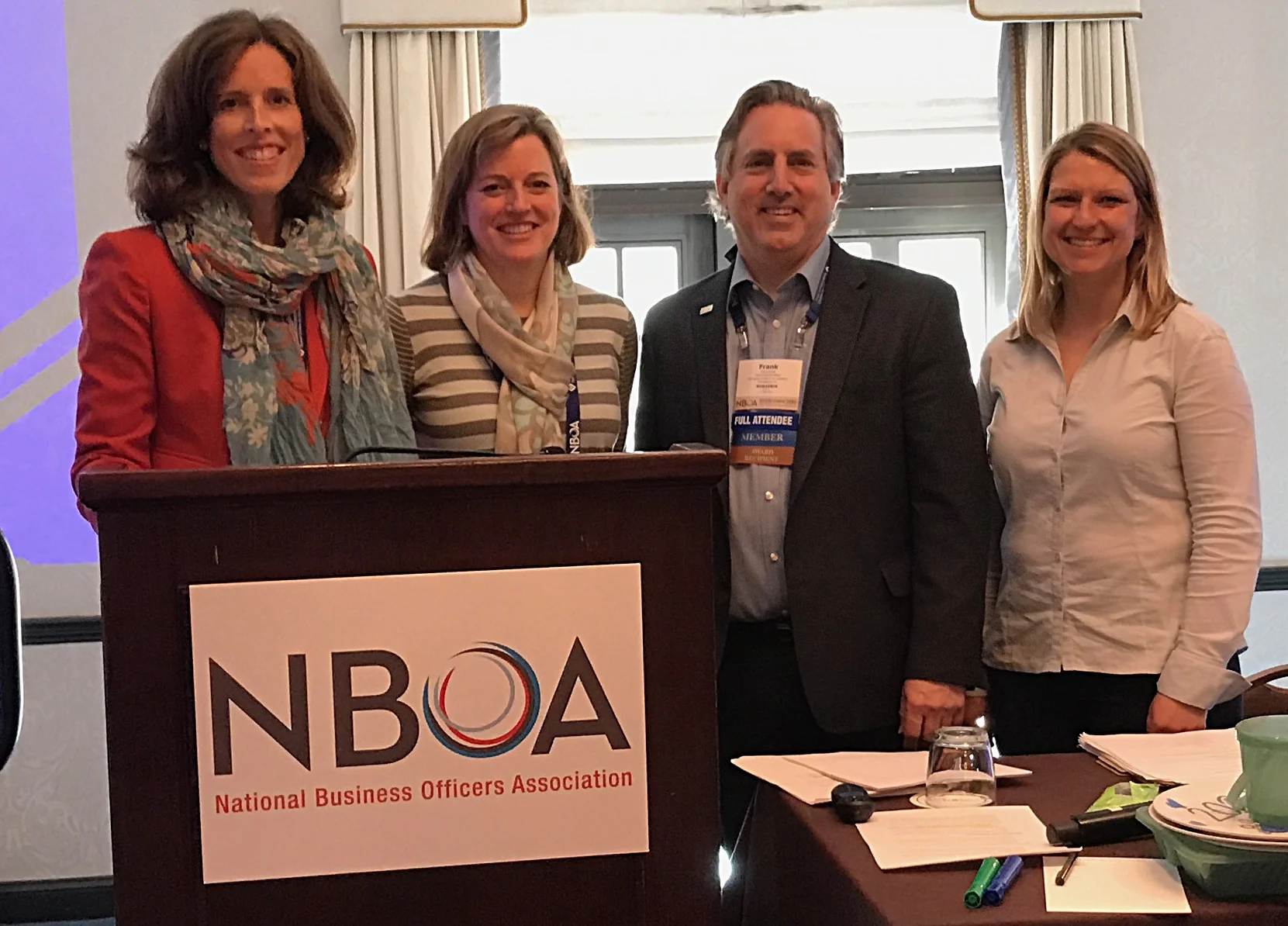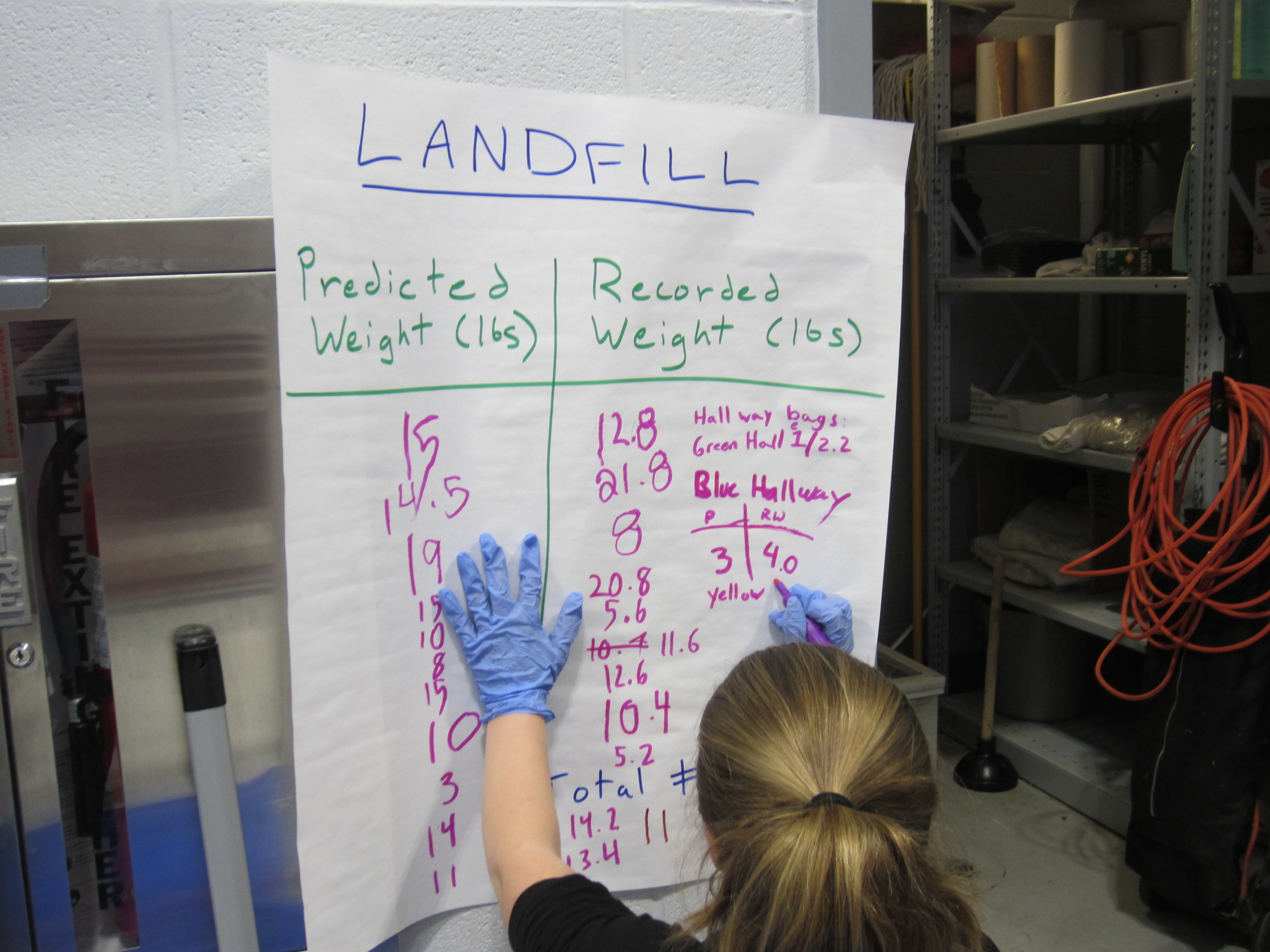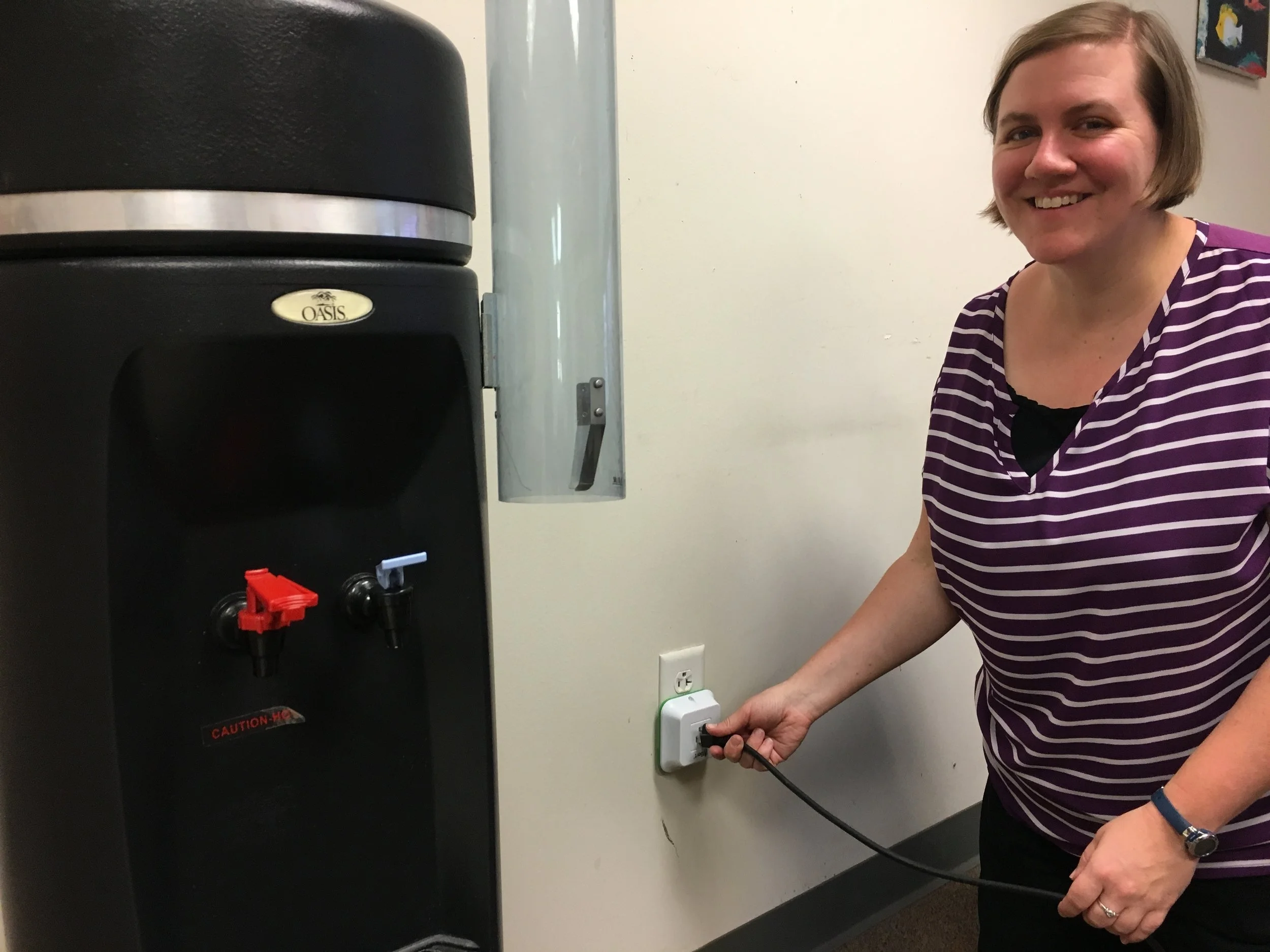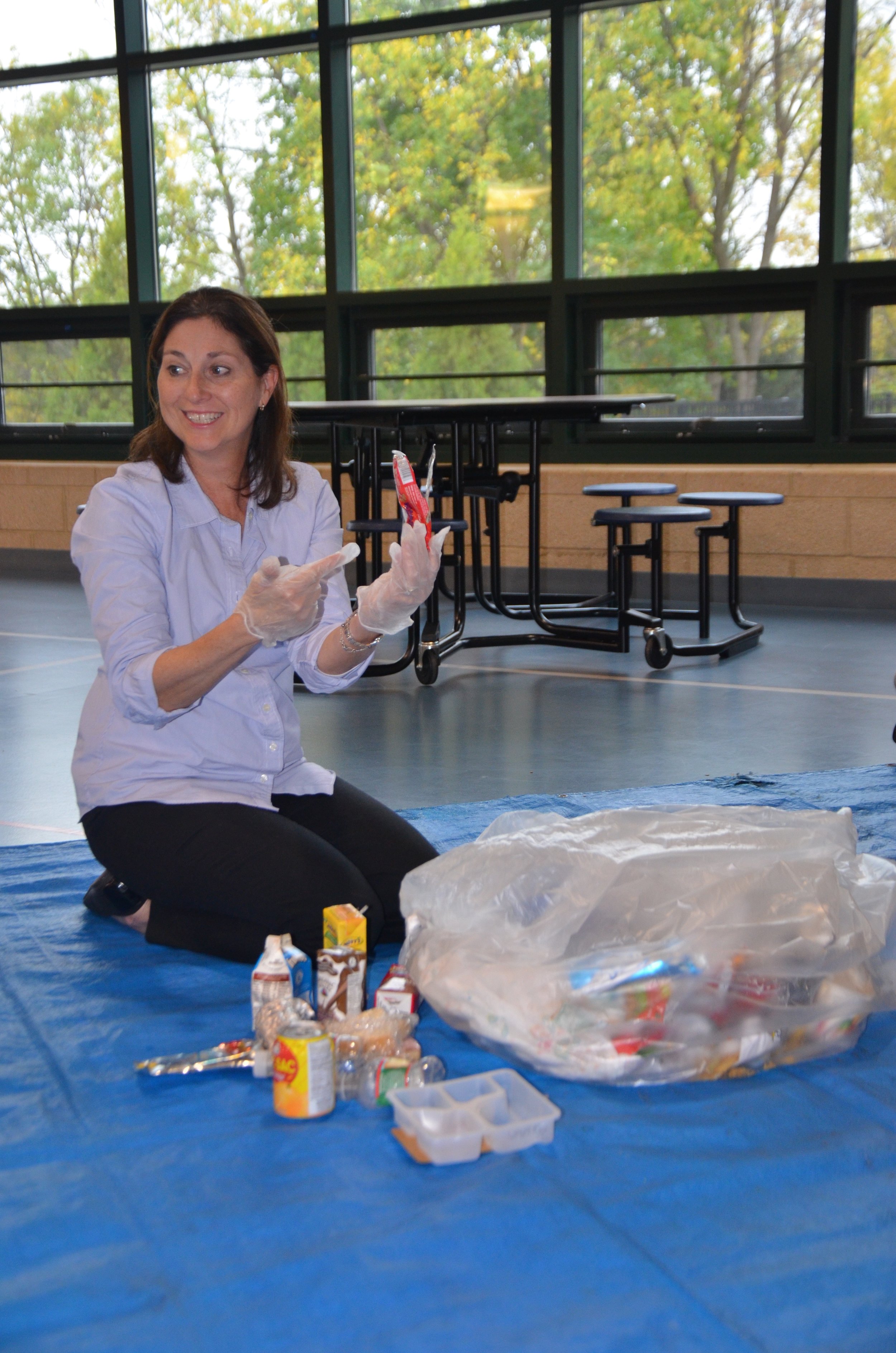Panelists at the PAISBOA Low Waste Virtual Meeting share their tips for reducing waste from changing behavior, to educating people about recycling right, to recycling electronic waste.
“Leading Change: Environmental Sustainability at Your School” Panel Discussion
On March 8, the PAISBOA Sustainability Group hosted a virtual panel discussion: “Leading Change: Environmental Sustainability at Your School.” Panelists included Lisa Carbone Warren, Director of Finance & Operations at Moorestown Friends School (MFS), and Carolyn Hapeman, Dean of Finance & Operations at Westtown School and Mary Ann Boyer of Boyer Sudduth Environmental Consultants.
GDS Students Propose Reducing School Emissions with the Climate Footprint Challenge©
Georgetown Day School (GDS) Environmental Science students in CA Pilling’s class gained real-world experience this spring by studying their school’s carbon emissions. Students collected and analyzed data pertaining to three areas of the school: facilities (energy use), transportation, and waste.
Courtyard Renovation Sparks a Green Future for Reading High School
While the 2019-20 school year may have been an unconventional academic year for Reading High School (RHS), it has been a year of green changes. During this time, the school created plans to transform its overgrown and underused interior courtyard into a welcoming outdoor classroom and natural refuge. Students and teachers of a “green team” led these efforts. Their hard work paid off: RHS became the first school in Berks County, PA to become a certified National Wildlife Federation Eco School, achieving the bronze award for its “schoolyard habitat” improvements.
PAISBOA Hosts Environmental Sustainability Webinar
With Earth Day around the corner, PAISBOA recently hosted a webinar on Leading Change: Environmental Sustainability. Sponsored by PECO Smart Energy, the program featured Mary Ann Boyer and Anne Sudduth of Boyer Sudduth Environmental Consultants along with Chief Financial Officers Frank Aloise from Springside Chestnut Hill Academy (SCH) and Miriam Fisher Schaefer of Friends Central School (FCS).
Aquaponics in the Classroom: PAISBOA Sustainability Group Visits Agnes Irwin School
The PAISBOA Sustainability Group convened at The Agnes Irwin School (AIS) on January 14th. Head of School, Dr. Wendy Hill, welcomed over 36 participants from 13 different institutions and highlighted how sustainability has been integrated into the buildings and classrooms at AIS along with a special focus on aquaponics.
First Graders Make a Difference with Waste Free Lunches
During the beginning of school last year, first grade students in Brooke Donovan’s class conducted a classroom waste audit. “We took a close look at the amount of trash we generated after one lunch. Students counted the number of yogurt cups, plastic forks and knives, juice boxes and other trash that we generated” she noted. “Then they discussed what they could do to reduce this waste.”
Derby Academy earns National Wildlife Federation Eco Schools Bronze Award
On the morning of April 22nd, Derby Academy students and faculty gathered to kick off Earth Week with a presentation on how to tackle today’s environmental challenges by Anne Sudduth of Boyer Sudduth Environmental Consultants. The address then culminated in the presentation of the National Wildlife Federation Eco Schools Bronze Award to the Derby community.
Reading High School Students Celebrate Plans for a New Courtyard
Reading High School’s Green Committee Takes a Fresh Look at its Interior Courtyard
We’ve been working on something new…
Since August 2018, Boyer Sudduth Environmental Consultants met to organize, brainstorm, and plan -- and then organize, brainstorm and plan again, with Reading High School students, teachers and staff to develop a vision for a project that would invigorate their environmental education and school sustainability. Now it’s time for the big reveal…The Living Learning Laboratory Project. Reading High School will transform their unused school courtyard into a vibrant, biodiverse space where students can engage in hands-on STEAM learning outdoors.
The Green Committee at Reading High School believes “This project will foster a generation of citizens who are prepared to become creative and innovative leaders, to take care of their environment, and to actively participate in their community for years to come.” We think so, too!
Reading High School’s Green Committee members
RHS’s Green Committee of faculty and students review design drawings by Structure Green’s Ann Sellers (pictured second from left)
A section of the existing courtyard at RHS which will be renovated into a new outdoor learning space.
Science teacher and Green Committee faculty leader, Jeannine Michel, with one of RHS’s courtyard inhabitants--Big Mamma
We are so excited to work with a talented group of people: the students of the Eco Club, Faculty Green Committee Lead and Environmental Science teacher, Jeannine Michel (pictured below), landscape designer Ann Sellers, and agriculturalist Kent Himmelright of the Berks County Conservation District to make this vision possible. On April 11, the School will have a “Green Between” event from 3 to 5 pm with area community partners to raise awareness about the plans for the Courtyard. We hope to break ground late spring and during the summer. Check back in with us as this courtyard, and the Reading High School community, transform.
By Emma Schlam, Sustainability Intern at Boyer Sudduth Environmental Consultants, and grad student at Clark University pursuing dual degrees in Master of Business Administration and Master of Environmental Science and Policy.
Boyer Sudduth NOMINATED FOR 2018 SustainPHL AWARD
Area Teachers Get Climate Ready with PD Session at the Franklin Institute
Teachers in grades 4-12 from the School District of Philadelphia, area charter and independent schools participated in a professional development workshop at the Franklin Institute on May 16, 2018. The event, “Get Climate Ready,” empowered teachers with the tools to incorporate hands-on activities and lesson plans about climate change into their curriculum as well as help their school reduce climate impacts.
Red Clay School Goes Green: Cooke Elementary’s Waste Audit
How much waste does one elementary school produce each lunch period? This was the question that motivated William F. Cooke Elementary School’s Talented and Gifted (TAG) program students to conduct a waste audit on March 13th. Realizing that they needed to know what they were up against before they could make a change, the students of the TAG program at Cooke set out to find exactly what was in their waste
Cooke Elementary students predict how much waste they generate in the cafeteria before weighing each bag as part of their waste audit.
Teacher Christine Szegda received a grant from the Delaware Pathways to Green Schools Program. Ms. Szegda enlisted school sustainability consultants, Mary Ann Boyer and Sam York of Boyer Sudduth Environmental Consultants (BSEC) to help plan and run the audit. Together, they set the date for the first waste audit on March 13th and developed an agenda for the day.
When the day came, Ms Szegda’s TAG students, the Cooke Elementary Custodial staff, BSEC, and parent volunteers came together to make the day a success. The fact that it was chili day did not deter the TAG students, who eagerly investigated the waste in order to find the information that would let them develop an action plan for reducing waste.
What the students found was staggering: the school’s 653 students in grades K - 5 produced 153 pounds of trash and 13 pounds of recycling from just one day of cafeteria waste, and 33.4 pounds of liquid waste from emptied water and milk bottles. Using these numbers, we can estimate that in one week, the school produces 653 pounds of trash, 65 pounds of recycled materials, and 167 pounds of liquid waste. Imagine what those numbers are in a school year? But this is only a single school! As parent volunteer Lisa Call said, “Imagine how much is wasted in Delaware alone, not to mention the rest of the country.”
These numbers motivated TAG students to immediately pull together plans for how to reduce the amount of waste produced. Ms. Szegda and her students will develop an action plan for making changes to reduce waste and increase recycling. They will implement changes and conduct a second waste audit in the spring to compare their results with this first one. According to one student, "We want the cafeteria to stop using styrofoam lunch trays. They get used once and then sit in a landfill for thousands of years after!”
Students were surprised by how much food was thrown away each day. “After combing through unopened snack bags, unpeeled bananas, and half eaten lunches,” noted Ms Szegda, “they had a real ah-ha moment.” The students learned that the average American throws out 4.4 pounds of trash a day. After seeing the food waste, students began to think about more sustainable and affordable solutions. Giving students only as much food as they will eat and encouraging students to use the "share bin" would help reduce the amount of food that would end up in a landfill each day.
The students found some positive data too: almost everything that was put into the recycling was recyclable. They now know, however, just how big their task is. Over the coming weeks, Ms. Szedga and her students will look more closely at waste and help teach others about what they can do to lessen their environmental footprint. The students will review the data from the audit and develop an action plan for reducing the waste. Ms Szedga reflected, “Making effective change always takes hard work, but I’m sure the students will use their creative energy and enthusiasm to show others how to make Red Clay a greener place.”
Article submitted by Sam York, intern of Boyer Sudduth Environmental Consultants.
Beware of Energy Vampires: Reduce Your School’s Energy Bill by Tackling these Common Goblins
Transforming Schoolyard Habitats and Nature Play Spaces Offer Students More than Exercise
William Cramp Community School's new playspace.
This spring, Boyer Sudduth worked with PA Green and Healthy Schools Partnership (PAGHSP) on a series of educational webinars and workshops for school administrators, teachers, and staff focused on efforts to “green” schools. On April 6, 2017, PAGHSP featured a webinar called “Transforming Schoolyard Habitats and Nature Play Spaces,” which can be viewed below.
In the webinar, Director of Interpret Green & Neighborhood Nature Works in Philadelphia, Craig Johnson, and Sr Policy Advisor for the MD Dept of Natural Resources, Sandi Olek, share their expertise on creating wildlife habitats and nature play spaces for schoolyards, playgrounds, and parks. Sandi shows examples of innovative play environments built from natural elements. Craig illustrates excellent examples on how schools can enhance outdoor playspaces by adopting guidelines from National Wildlife Federation to create innovative “learning landscapes.” These landscapes can include pollinator gardens, bird feeders and houses, bug magnifier posts, sundials, compass roses, naturecams, and weather stations for environmental education and free-play exploration. Here, children can study nature and enjoy recreation in the same location. Craig and Sandi also shared a list of kid-friendly nature tools for observing and recording critters.
According to Craig, nature habitats help playspaces come alive. Craig’s work with Philadelphia’s William Cramp Community School gives students direct and daily access to the wondrous web-of-life. Birds, butterflies, bees, beetles, bats, and a host of native plants provide endless opportunities for children to connect with nature and each other. Craig notes, “Within two days of installing the bird feeders, mourning doves, sparrows, and finches were singing in schoolyard.” Another teacher reflects, “I have been here for 20 years. This is the first time I have ever seen birds at this school. The students are so delighted.”
In competition with television, phones, and video games, “unplugged” outside time is critical to a child’s playtime and development now more than ever. The American Academy of Pediatrics recommends 60 minutes of unstructured free play as an essential part of children’s physical and mental health and social development. Click here for a link to the webinar.
A William Cramp student in the school's new garden.
Article submitted by Emily Tronson, a junior majoring in Ecology & Evolutionary Biology and English Literature at the University of Rochester who is currently interning at Boyer Sudduth Environmental Consultants.
Taking a Bite Out of Waste
Not Your Grandmother's Gingerbread House
What do you get when you pair a future environmental engineer, an aspiring architect, some gingerbread and frosting? Not your grandmother's gingerbread house, but a sustainable one. Mary Ann Boyer met with Hill School students in the Eco Action Club to conduct a workshop on green buildings. Students incorporated lessons learned by building "green" gingerbread houses.
AFS Outside Committee Considers Next Projects
NFA Wins Grant for Sustainability
Norwood-Fontbonne Academy received a grant from the Philadelphia Area Independent Schools Business Officers Association to address environmental sustainability and foster collaboration between the school and neighboring institutions.
NFA teamed up with its Parents Association, Chestnut Hill College, Morris Arboretum, and Boyer Sudduth Environmental Consultants to create a Collaborative Waste Initiative to reduce waste, increase recycling, and strengthen community ties.
Compost 101: Ancillae-Assumpta Academy Does it Right
Ancillae-Assumpta Academy composts all of its dining room waste with support from their students and faculty. Ancillae-Assumpta’s green initiatives include solar panels, school gardens, outdoor education, to name a few. However, the school decided to do even more. Boyer Sudduth Environmental Consultants lead facilitated meetings with the faculty and administration to identify sustainability goals. Food Service Coordinator Sarah Wade took on composting all food waste generated by students and staff.























